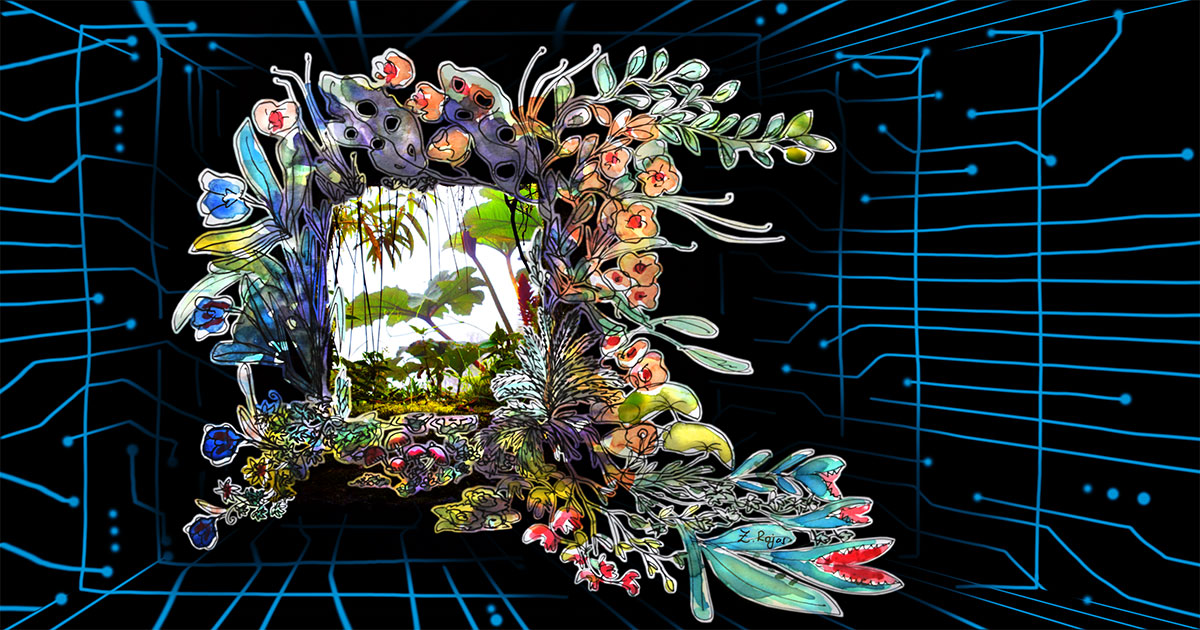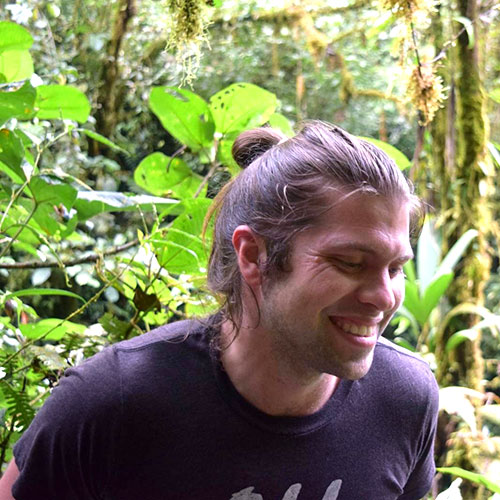LET’S DO LUDDISM
★ ★ ★ ★
ECOSYSTEMS

Art by Andrea Zambrano Rojas
By Cory Massaro
A couple weeks ago, a friend sent me an article about the “NFT Ecosystem.” I’m sure we’ll talk about NFTs sometime (they’re an interesting technology currently being used to create digital Beanie Babies for memers, computer fondlers, and Elon Musk worshippers), but it is the other word that made us suspicious. “Why do I keep seeing ‘ecosystem’ used this way?” my friend asked.
I first heard about this kind of “ecosystem” in the bowels of Google. I was a new engineer and had been assigned to a three-month stint on a team that managed Chromium. “Chromium ecosystem” is standard tech language (e.g.). It means that Chromium, the basis for the Google Chrome browser, is the foundation on which a complex network of competing technologies is built. If these technologies are the snakes and leopards and plants of this ecosystem, then Chromium, a little island of code and live servers, is the very Earth, or perhaps the Sun.
For my colleagues, the ecosystem was indeed a matter of cosmological significance. This was the type of crew who’d rig up cameras and motion detection software to monitor their housebound dogs from the office. The true devotees among them would host impromptu symposia in the office on Thursday and Friday nights. They’d swirl highballs of top-shelf whiskey and nod like sages over talk of the big tech investors’ next big moves. The sages’ talk was gentle but competitive, a matter of who knew more. Others, playing Dionysus to this Apollonian solemnity, would shout memes at the sages between rounds of online shooting games.
The sages always circled back to “ecosystems.” But there, too, they spoke adversarially. Never mentioned but always lurking was the libertarian axiom that ecosystems were important because they served (profitably) as arenas for competition. The plants and the leopards and the serpents could tear themselves to shreds, and they’d all be paying dues to the abundant Earth.
~
So the world-as-built (by imperialists, by capitalists, by tech) is one of atomization and competition. But the world-as-evolved embeds complex, intimate, indivisible webs of relation. My friend who asked me about “NFT ecosystems” doesn’t speak in atomic, adversarial terms, but cooperative ones; she found this usage of “ecosystem” baffling, its linguistic context bizarre. I wondered if linguistic context itself could tell us something—if by seeing people’s language for what it is, we could learn which side they’re on.
To this end, I decided to research how the term “ecosystem” is used in media. The first instance I could find of “ecosystem” (in the metaphorical, techie sense) is from 2003, in an Apple press release. In it, the video editing software Final Cut Pro is anticipated to become a primary producer in the editing ecosystem. It’s business talk more than tech talk, but it anticipates a more intricate naturalistic allegory peculiar to tech.
I analyzed keywords from news articles. I was surprised at how many of the keywords were ambiguous, equally applicable to both domains. Out of context, I didn’t know if “cloud” referred to “the cloud” or a cumulonimbus. I didn’t know if “growth” was a tree’s or a company’s. “Amazon” was tragically ambiguous. But I did know that elemental language, “tree” and “air” and “fire,” and “horseshoe crabs,” and “more crabs,” meant we were talking about nature and not NFTs. Tech discourse rarely cares about “human health” but loves it some “markets.”
I then split the news articles into a “nature” half and a “tech” half. I found that an “ecosystem” is something inimical and hostile for techies, but something friendly, communal, and mutually dependent for environmentalists. Tech ecosystems measure the atomic military strength of individual parts; environmental ones are robust and resilient due to the cooperation of their members. Here are a few articles, chosen more-or-less at random, which exemplify the “nature”/”tech” divide:
Nature: here is an article about Turkish forests decimated by fire. It notes the damage to honey production and calls ecologists to restore the trees that help the bees.
Tech: here is one about the relative success of “Super Hard Materials” companies during the pandemic. It speaks of a “competitive landscape,” which sounds like Milton’s angels throwing mountains.
Nature: this bit on the UNESCO Man and Biosphere program. It speaks of “support” for “local and indigenous communities,” of “international cooperation for river basin management,” of the “first biosphere reserve to connect five countries in the world.”
Tech: this encomium immortalizes the victory of a payment processing company over its 69 competitors. 69 competitors doing largely the same work, running up an electric bill and melting silicon, only to be cast down in their shame.
Nature: some environmentalist-leaning articles seek to democratize and educate. This one discusses local food systems and treats the reader as an integral part thereof. There’s a sense of participatory holism here, of a Paradise we could reach if we just worked together.
Tech: Davids are swinging at Goliaths, “avoiding direct competition” with “rivals” in order to “seize opportunity.”
~
I think cooperative relationships must exist in nature, and that humans can relate to nature and each other in mutually beneficial ways. Humans stewarded the land before they thought to turn it into capital. To accomplish this, imperialists and heads of state sent their thugs out domestically and abroad. The thugs murdered or suborned the lands’ stewards and planted stakes of ownership. Perhaps the triumph and tragedy of the information age, then, is this new ability to conjure, pre-commodified and unambiguously owned, infinite and manifold virtual realms, where hegemony and proprietary relationships are baked in at the moment of cosmogony. It’s still imperialism, sort of bloodless but very bleak.
THE LUDDITE BESTIARY
The Tinderbird: As the ruin of car horns drowned out mating songs, and it became too hot to fly, and there were fewer birds anyway due to the fires and the steel, the avians that wished to mate for life found themselves lonely.
They flew here and there, and the magnetic bit in their brains that told them north began to tell them other things. They would perch on windowsills as the people swiped right on dating apps, and the birds could feel their swipes the way they used to feel migration.
And if the birds shook their heads just so, they could vibrate the ether and talk back to the apps. They launched their binarized pirate chirps into the endless streams of sterile lust. And then they listened.
It is said the best thing we can do for them is this: always swipe right in view of the sky. Put feathers in your profile picture. Speak in a low voice and never whistle while swiping. In this way, you, too, can be a wingman.

Cory Massaro is a native of Ohio, U.S.A., now at home in Quito, Ecuador. He spends his time learning languages, writing, playing music, coding, and propagandizing. He actively opposes materialism, consumption-as-cultural mandate, and all forms of hegemony. He is in favor of small, robust communities and gently destroying hierarchies wherever he goes. His fiction and poetry draw on the grievances he has stored in his heart since working in technology; his dearest hope is to predict accurately how egalitarian, worker-centered societies will revive the oral tradition to weather the climate wars.
See more work by artist Andrea Zambrano Rojas here.
























0 Comments